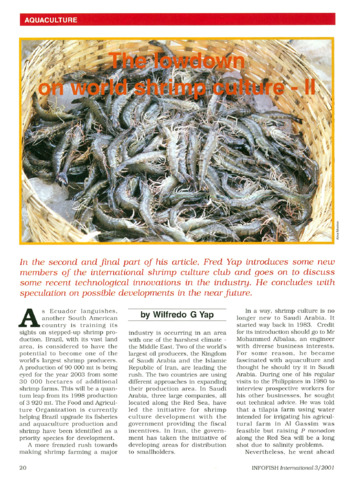Effects of different sex ratios on maturation, fecundity and hatching rates of ablated Penaeus monodon wild stock
Share
Abstract
The minimum number of males per female that would still ensure high maturation, fecundity and hatching rates in Penaeus monodon broodstock, is determined. Wild stock P. monodon were stocked in 4 m diameter circular tanks at different sex ratios (0:1, 1:1, 1:2 and 1:4 male to female) for a duration of 55 days. All females were ablated on one eyestalk. Males remained unablated. The 1 male: 2 females ratio is recommended on the basis of highest percentage of first, second and third spawners, total and average fecundity. In the all-female treatment (0:1 ratio), 19.65% of the females spawned, but the 3.3 million eggs produced were not fertilized, resulting in a 0% hatching rate.
Suggested Citation
Pudadera, R. A., Primavera, J., & Young, A. T. G. (1980). Effects of different sex ratios on maturation, fecundity and hatching rates of ablated Penaeus monodon wild stock. Fisheries Research Journal of the Philippines , 5(1), 1-6. http://hdl.handle.net/10862/1097
Subject
Taxonomic term
Collections
- AQD Journal Articles [1248]
Related items
Showing items related by title, author, creator and subject.
-
An overview of the nutrition, feed and feeding techniques of prawn penaeid/shrimps
Piedad-Pascual, Felicitas (Philippine Council for Aquatic and Marine Research and Development, 1989)This paper echoes what transpired during the first International Conference of Penaeid Prawns/Shrimps held in Iloilo City in December 4-7, 1984, particularly on the Nutrition nd Feed Development. Around 25 papers were ... -
Prawn hatchery operations
Parado-Estepa, Fe D.; Quinitio, Emilia T.; Borlongan, Emeterio L. (Aquaculture Department, Southeast Asian Fisheries Development Center, 1996-05)The manual, an updated version of the 1984 SEAFDEC/AQD manual, presents the underlying principles and step-by-step instructions of prawn larval and post-larval rearing. The techniques described are not only applicable to ... -
The lowdown on world shrimp culture - II
Yap, Wilfredo G. (INFOFISH, 2001)This paper introduces some new members of the international shrimp culture club and goes on to discuss some recent technological innovations in the industry, particularly the polyculture of tilapia (mainly Oreochromis ...




